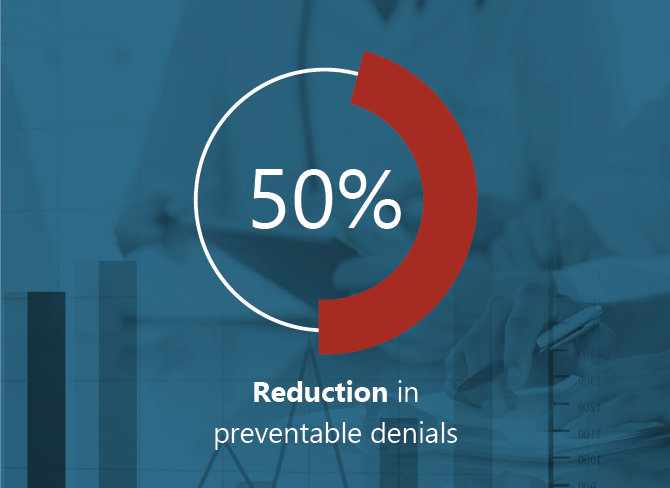
Ambulatory Revenue Cycle | Download a PDF Version of the Case Study |
OVERVIEW
HSG was recently requested to perform an ambulatory revenue cycle assessment with recommendations for improvement for a client in the Northeast. Statistical analyses along with on-site evaluations were conducted which identified numerous factors affecting financial performance as well as patient access. Claims denials management and coding documentation and education we highlighted as two key factors negatively impacting the financial performance of the employed medical group. Through a front-end assessment and four months of onsite support, denial rates were reduced by 50% and staff were appropriately positioned and educated to manage processes effectively moving forward without outside assistance.
CLIENT QUICK FACTS
Based in Northeast United States
115-bed acute care hospital
65+ employed providers
$265m net revenue
Client since: 2018
“We selected HSG to provide strategic and operational assessments of the ambulatory revenue cycle component of our small but growing practice network. Both the analytical and on-site work, along with subsequent written reports were thorough and replete with well-vetted, actionable recommendations for performance improvement and long-term sustainability.”
– Health System CEO
CHALLENGES
The employed physician network had quietly grown over the past decade without the infrastructure to support it combined with a culture devoid of communication between the facility and the professional revenue cycle components of the enterprise. Revenue cycle resources existing in the hospital setting were not available to the employed physician practices.
Data Analysis Revealed:
High claim denial rates and revenue losses
High claim scrubber volumes
High charge lag particularly in surgical specialties
Coding deficiencies
High staff turnover due to lack of training and competitive wages
On-Site Evaluations Discovered:
Insufficient electronic medical record (EMR) training at every level
Redundant workflows
Lack of resources and standardized process for registration
Insurance verification and collection of copays and past balances
Lack of feedback on claim delays or denials
Lack of IT support and enhanced technology be either hardware or software access with lack of optimization to improve documentation and coding
In addition to the lack of feedback on claim delays or denials, the entity did not provide any coding support for the employed providers. Physician contracts were not updated to reflect local or national norms or to provide meaningful incentives for patient access and timely claim filing. Patient access, along with the revenue cycle woes and decreased physician and practice compensation, were all impacted by practice inefficiencies and lack of education and support.
As a result of the front-end analytics and on-site assessment of our ambulatory revenue cycle function by HSG, along with four months of onsite revenue cycle expertise support, the client was able to:
Implement best practices
Improve education and training
Remedy staffing deficiencies and update wage scales
Hire coding and billing staff
Provide feedback to providers on financial performance
In less than six months from engagement onset to completion, the client was able to reduce preventable denials by 50%, hire coding staff to improve documentation and provide education, and most importantly was empowered to manage the situation moving forward to limit the need for outside support to overcome similar issues in the future.

